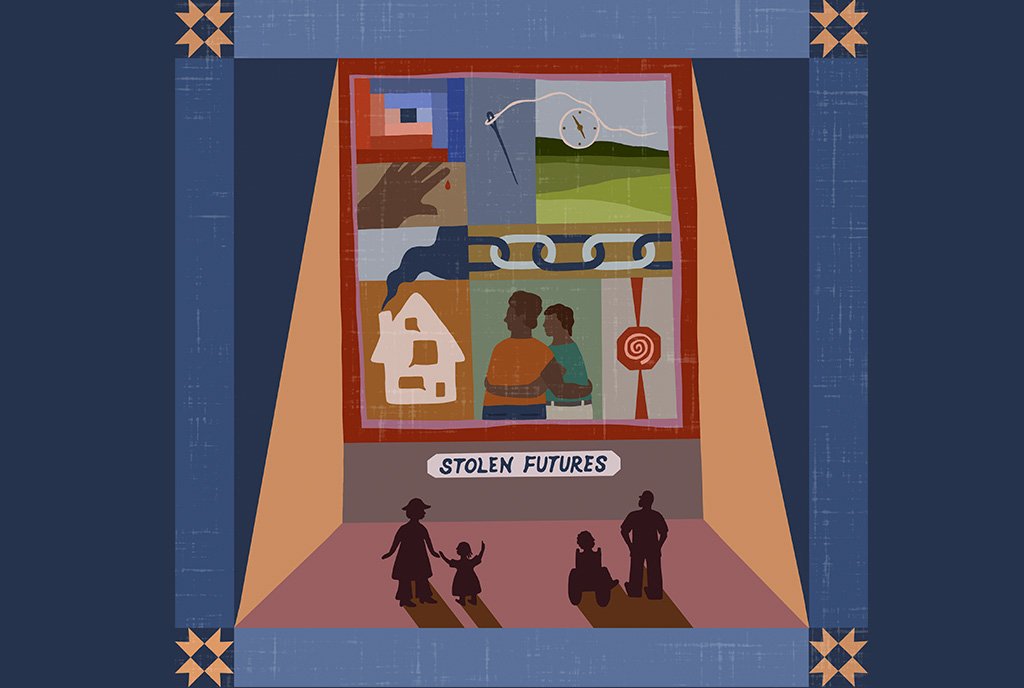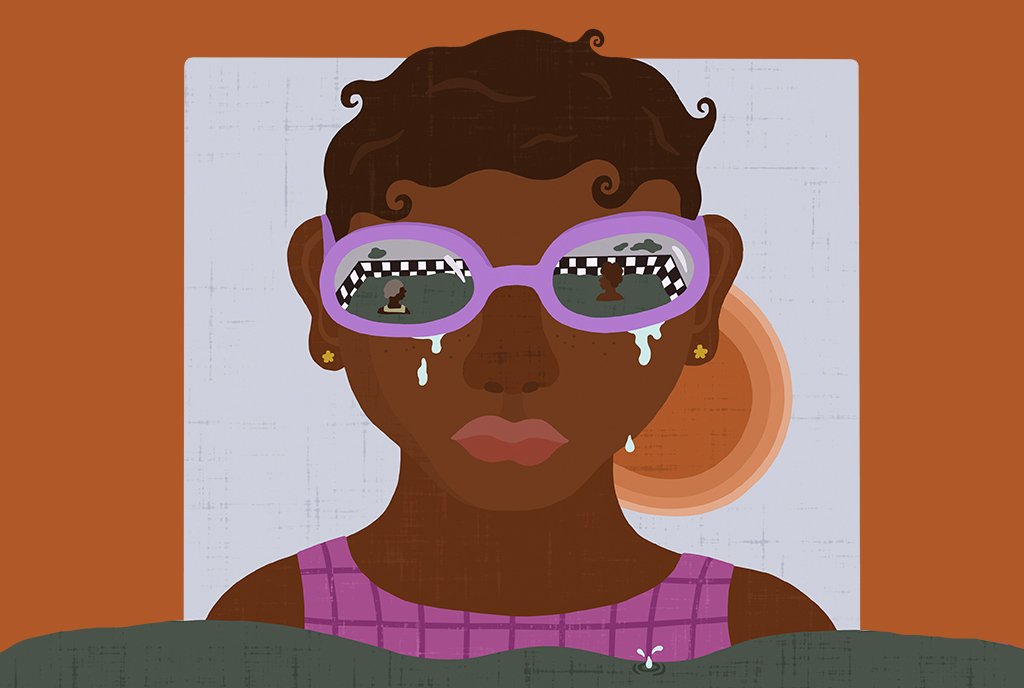
This article concludes a three-part series, Quiet Violence: How the Tax System Works Against Black Americans, co-produced by The Maven Collaborative and NPQ. This series explores how the taxation system’s “quiet violence” enacted against Black Americans leads not only to financial inequality but also to stolen legacies, futures, peace, and health—and presents solutions for equitable change.
Exploitation, denigration and dehumanization of Black people are, sadly, central themes of US history. The nation’s tax system is no exception. Far from being race-neutral, the US tax system employs economic policies that act as a hidden tax on Black people through things like fines that perpetuate racial and economic inequality.
While the violence of the tax system may be quiet, the consequences are thunderous.
Changing this requires both systemic reform in the short term, and a reimagination and creation of a new system in the long term. Creating a new system will not only help Black people, but all who are ensnared within an economy that has primarily benefited White elites. By crafting solutions that address the root causes of these systemic injustices, it becomes possible to build something better.
The Stolens
To build something better, it needs to be new. Attempting to patch existing gaps isn’t feasible. That’s because the impact of the nation’s current system is expansive and multifaceted and cannot be addressed fully by merely tinkering around the edges. And to build this new, better system, its history must be clearly understood.
While the violence of the tax system may be quiet, the consequences are thunderous, resulting in what we have deemed “The Stolens.” Our recent research on this issue uplifts what is often missed in the mainstream discussions about taxes: The human toll our tax system instills on Black families and communities, in addition to the financial treachery inflicted.
Below, we outline that human toll so that we can build toward a better future with the knowledge of our history in mind:
- Stolen Legacy and Futures
As outlined in our report, the intergenerational impact of tax policies like the Black Codes, property tax abuse, and licensing fees on entrepreneurs has resulted in stolen land and homes from Black people, and has prevented Black families from holding onto accumulating and transferring wealth, often spiraling them into debt.
Government actions also restricted choices on where Black people can live. This all hindered Black families’ abilities to pass on inheritance, knowledge, cultural heritage, and opportunities to future generations.
Even today, hair braiding licensing fees continue to prevent Black women from passing down their cultural traditions, and the continued use of regressive taxes disproportionately burden low-income families and hinder their ability to save and build wealth, limiting the economic mobility of each generation of Black people.
- Stolen Choice and Time
Racially segregated neighborhoods and the accompanying intentional lack of investments in quality public goods, like public transportation systems or decent schools in Black neighborhoods, result in both the extraction of time and choice for Black families.
As part of the Quiet Violence project, we interviewed Black subject matter experts to gain a better understanding of the vastness of this issue. As one person we interviewed stated, “I think of all of the [predominantly] Black cities I’ve lived in…how long it takes to get to work, or get groceries, or get to wherever. It’s just adding three hours to your workday sometimes, because even though you work two miles away, it takes an hour and a half travel time on the bus to get you where you’re going.”
Black neighborhoods are often targeted and surveilled by the police to pad city and local budgets through legal-system fines and fees.
Since schools are funded by property taxes, and Black neighborhoods are routinely devalued, Black families have limited choices on where to send their children to school. Another interviewee pointed out: “A lot of folks pay for the taxes for your neighborhood school—but if schools aren’t adequate, then you have to pay tuition on top of taxes in order to send kids to schools they feel safe sending them to.”
- Stolen Hopes and Dreams
Even though Black people are taxed more, they are largely unable to reap the benefits of the system they are paying into. Instead, our tax system disproportionately supports the stability and comfort of White families.
Relegated to live in disinvested communities, Black residents often lack access to nice parks, libraries, community centers, paved streets, and so on. This contributes to a lack of hope and a stealing of dreams and possibilities. As another interviewee stated, “I think that in very poor communities also, people just have given up. They just expect that this is what I’m entitled to: bad schools, bad parks, bad streets, dangerous communities.”
- Stolen Peace and Dignity
The extreme weight of the mental stress that accompanies unexpected expenses due to where you live, and the hostility from public officials like police officers, are a constant attempt to strip Black people of their humanity. Even if someone chooses to live in a different neighborhood that is not majority Black, to access better public goods, their peace and dignity are impacted.
One interviewee told us, “I used to live in the North Side of Chicago for transit reasons, honestly. And I would be stopped by the police like once a month because that neighborhood I believe is over 90 percent White.…They basically treated me like I was already guilty. Like, even though I pay taxes there, ‘This is not…an area for you. You don’t belong here.’’”
- Stolen Health and Safety
There’s also a physical toll that Black people experience, which steals from their physical and mental health, along with their personal safety. As the federal government’s report on Ferguson, MO, aptly pointed out, Black neighborhoods are often targeted and surveilled by the police to pad city and local budgets through legal-system fines and fees.
The mental stress associated with ballooning debt from fines and fees is well-documented, not to mention the risk of physical safety from interaction with a hostile police force. Studies on racial weathering—how stress from racism impacts people physically—have also shown how stress wears down internal organs and ages Black people prematurely.
Sign up for our free newsletters
Subscribe to NPQ's newsletters to have our top stories delivered directly to your inbox.
By signing up, you agree to our privacy policy and terms of use, and to receive messages from NPQ and our partners.
As another interviewee stated: “Stress is actually one of the leading causes of death, especially predominantly for Black women, including from maternal health, but also across the board.”
The constant threat against physical and emotional wellbeing is a fundamental example of the quiet violence Black people are facing on a daily basis.
Why This Matters: Building Multiracial Solidarity
While anti-Blackness is a core feature of our current tax system and attention should be paid to what this means for the lives and humanity of Black people, this injustice touches non-Black people as well, particularly those who live at the margins of our economy—low-income people of all races and ethnicities. Continuing to operate within a system that upholds White supremacy, as our tax system currently does, impedes society writ large.
The introduction of the sales tax is a prime example of this. In the 1930s, Mississippi became one of the first states to implement a sales tax as a way to reduce property taxes on wealthy White landowners and levy taxes on Black people who owned little to no property due to barriers erected by policymakers.
This was an intentional act to shift the tax base from wealthy people to poor people, who at that time in Mississippi were mostly Black. Now, 45 states have this regressive tax in place that disproportionately extracts money from poorer communities, since they earn less and, therefore, are paying more of their income in taxes than wealthier people.
At a time when people are hungry for leadership and change, tax justice is an ideal issue to organize around. Advocates can use this moment to form partnerships among Black, Indigenous, Latinx, Asian American and Pacific Islander, and poor White people to both recognize how anti-Blackness impacts us all, and to advocate for a fairer and more just tax system to create a vibrant society where we all thrive.
Our society doesn’t have to live with what we inherited. Advocates can join in producing aspirational alternatives because it’s what we all deserve.
Solutions
While the systems and institutions around us crash and burn under the current federal leadership, those of us who care about creating a country where everyone can succeed must focus on tapping into our imaginations and creativity to build something new.
Our tax system is no different. Now is the time to envision what an equitable tax system could look like.
How can a fair tax system be crafted? One way to begin to do this visioning is by looking to Black women who have consistently proven their leadership mettle. With multiple forms of oppression working against them, Black women have helped create renegade mutual aid programs like the Underground Railroad or the Black Panther Free Breakfast Program; they also started organizations like the National Welfare Rights Organization, which fought for care work to be validated and to be seen as dignified work. These were all ideas that were taken to scale nationally.
Black women have always operated with the idea that communal care is key. What would happen if people started with the thought that taxes are a form of community care?
Taxes should be seen as a communal pot that all members of society contribute to for the greater good. Starting with that premise, aspirational alternatives can surface. This type of visioning work is already happening with platforms like the People’s Energy Plan, the People’s Coalition for Safety and Freedom, and inspirational art initiatives like Land Narratives | Fantastic Futures which are all pushing us to tap into our creativity and imagination to create new economic models.
Additionally, movement leaders must work to change the narrative so that Black people are seen as tax and care makers, because that is truly what they are.
Funders interested in tax reform can invest in this idea and find organizations or coalitions that are creating groundbreaking narrative change projects that center Black people’s humanity—and are willing to uplift this alternate narrative.
Although a hostile administration blocks policy gains at the federal level, advocates can advance many reforms at the local and state levels, including:
- Pushing for changes in taxation formulas to address the devaluation of Black property within the property tax assessment and collection fields.
- Supporting policies that repeal regressive taxes and shift the tax burden from low-income families to wealthier individuals and corporations.
- Creating programs that offer tax credits, such as baby bonds, state expanded child tax credits, and other forms of relief specifically designed to address historical inequities and support wealth building in Black communities.
- Demanding increased investment in public education, healthcare, and other essential services that benefit all members of society.
Our society doesn’t have to live with what we inherited. Advocates can join in producing aspirational alternatives because it’s what we all deserve.
Let’s not just learn from Black women and turn to them in times of crisis, but ground their genius, desires, and dreams in our ideas toward collective care.
That is the mechanism to disrupt the power imbalance in the nation’s tax system and the pathway to a nation robust with public goods available to everyone.
This is a moment to dream big and build a multiracial coalition that is answering the call of our ancestors and the needs of our children and future generations. The portal for social justice will open again. The time to get ready is now.












